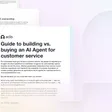
Guide to building vs. buying an AI Agent for customer service
This guide will help you assess the build vs buy question from 5 main angles so you can make a confident, informed decision.
Learn More

If you’re a fellow customer service professional, you likely know all about the benefits of AI for customer service.
You probably know that AI makes it possible for your business to support customers 24/7. And that with the right AI, you can provide highly personalized experiences to each person that interacts with your brand.
So I want to approach the idea of AI customer service from a different lens and propose that AI is no longer just a tool for customer service. It's a catalyst for transforming your entire business.
It’s time to move beyond seeing AI as merely a way to automate tasks or cut costs. Instead, think of it as a strategic asset that can reshape every aspect of your business. From uncovering insights that drive decision-making to predicting market shifts and personalizing customer experiences at scale, AI has the potential to be the engine of your company’s evolution.
 From tickets to insights: How AI for customer service is turning support data into product gold
From tickets to insights: How AI for customer service is turning support data into product gold Businesses that embrace this mindset will unlock growth opportunities across the board, while others risk being left behind, simply automating support tickets.
So now that you know that AI isn’t just about automating tasks (it’s more about redefining how businesses operate and grow) let’s take a closer look at the transformative power of AI in customer service. Here’s how to take your business beyond ticket resolution to driving measurable impact across your entire organization.
AI customer service goes beyond simple automation to deliver faster, smarter, and more personalized interactions. While traditional chatbots can only provide basic responses, AI solutions have evolved into sophisticated AI agents that understand customer queries, solve complex problems, and offer seamless support across channels.

To understand the evolution, let’s compare chatbots, AI chatbots, and AI agents.
Chatbots are rule-based programs designed to handle simple, scripted tasks. They follow a predefined set of instructions to answer common questions or execute simple commands.
For example, a traditional chatbot on an ecommerce site may provide automated responses to questions like "What’s the status of my order?" or "How do I return an item?" But if a customer asks a more nuanced question, such as "Can you suggest a gift based on my previous purchases?" the chatbot would likely fall short – it can only respond with a set reply based on preloaded information.
This results in a limited customer experience when customers deviate from expected questions.
AI chatbots represent a more advanced version of traditional chatbots, using Natural Language Processing (NLP) to understand the intent behind customer queries. They are capable of answering a broader range of questions and can learn from interactions to improve over time.
While still limited by the scope of their training data, AI chatbots offer a step up in terms of handling more varied and slightly complex queries.
An AI chatbot for a SaaS company could assist users by answering questions about software features or offering basic troubleshooting steps based on keywords in the query. For instance, if a user asks, "How do I reset my password?" the AI chatbot can guide them through the process, even if the phrasing of the question varies slightly.
AI agents take AI chatbots to the next level by combining NLP, machine learning, and advanced integrations to deliver a human-like experience. Unlike basic or even AI-enhanced chatbots, AI agents can handle complex tasks across multiple channels — including voice, email, chat, and social media — without missing a beat.
They not only respond to queries but also solve problems by accessing backend systems, pulling data from multiple sources, and taking action on behalf of the customer.
Consider John, a customer traveling in Japan who needs to resolve a software issue urgently. When he calls the support line, the AI agent recognizes his account, listens to his problem, and provides a voice-based solution in real-time. If poor connectivity forces John to switch to email, the AI agent continues the conversation seamlessly, responding to his inquiries instantly, even in the middle of the night.
The AI agent’s ability to integrate across channels and offer consistent support makes it a powerful tool for scaling omnichannel customer service while keeping the experience personal.
AI agents represent the future of AI customer service, offering the "golden ticket" to scaling support, reducing costs, and delivering exceptional customer experiences that make your brand stand out.
You can’t brag about having basic AI tools for customer service anymore. It’s table stakes. Simply experimenting with AI isn’t enough.
Chatbots excel in sourcing information and workflows from their training data and presenting it in a user-friendly manner, but their capacity for reasoning is non-existent. They rely fully on human instruction.
Now that we have AI agents — sophisticated, problem-solving powerhouses capable of reasoning through complex queries — having advanced AI isn’t a luxury, it’s the baseline requirement for any customer-centric business. Here’s why.
Ask your support team about their biggest challenges. The customer’s demand for instant responses will likely come up as a top challenge. Customers want near-instant responses across all channels:
Meeting these expectations is nearly impossible when you’re juggling multiple channels with a small team. That’s where AI steps in.
“AI agents are designed to intelligently reason through problems, learn from interactions, and make decisions. They can act autonomously, apply learned knowledge to accomplish tasks, and solve problems in real-time — making your customer service go from ordinary to extraordinary.”


AI agents can handle thousands of inquiries simultaneously, from basic FAQs to more complex issues like troubleshooting a potential bug, without any human intervention. By offloading routine tasks to AI, you can dramatically reduce response times and free your team to focus on higher-value interactions.
Today’s customers expect brands to know their preferences, understand their purchase history, and deliver personalized experiences throughout the buying journey.
According to McKinsey , consumers associate personalization with positive experiences where brands demonstrate an investment in the relationship — not just the transaction. But generating personalized responses for thousands of daily inquiries is resource-intensive and can lead to long wait times if handled manually. That’s why 89% of business leaders view personalization as crucial for success, and 88% are planning to adopt AI and machine learning tools in the near future.
Yet, personalization needs vary across the customer lifecycle:
AI can dynamically adjust its level of personalization based on where the customer is in their journey, ensuring the experience feels tailored without overwhelming your resources. Companies that struggle with AI-based personalization often miss these nuances, resulting in generic or misaligned customer experiences.
Customers expect a seamless, uninterrupted experiences across multiple channels . If they start a conversation on chat and need to continue it via email, they don’t want to repeat themselves.
But only 42% of customers report being "very satisfied" with the communication options businesses provide, largely due to a lack of channel consistency and convenience.
The solution is not to multiply your support efforts but to unify them. An AI agent offers centralized control over all channels, consolidating support efforts and automating responses across chat, email, phone, and social media.
For example, if a customer named John abandons a chat about a new feature and later follows up via email, the AI agent can pick up right where the chat left off, answering his question directly instead of starting the conversation from scratch.

$40,000 base plus additional pay. That’s how much a single service representative costs you.
While representatives are a crucial part of your customer service infrastructure, you don’t need a whole army to deliver high quality service. What you need is a scalable AI agent that can deliver exceptional service at the same cost, whether you have 100, 500, or 1,000 clients.
Most support agents are actually pro-AI. By handling routine queries, AI frees up agents’ time to dedicate to more challenging and rewarding areas of the job. That — and the fact that AI’s proven to elevate the quality of service while reducing operational costs — leads to 69% of future-ready support leaders planning to increase investments in AI-powered solutions over the next year.
Consider the case of Wealthsimple , a money management platform serving over 3 million Canadians. When Christine Farrugia, VP of Client Experience & Strategy, partnered with Ada in 2022, the goal wasn’t to reduce headcount but to optimize agent time.
“We pursued Ada to help us with cost savings but more importantly to make sure we are able to spend the most time with our clients who have the most complex issues. Ultimately we wanted to save agent hours and reinvest that time to support our clients in a more meaningful way.”


Before diving into AI implementation, it’s essential to build a strong foundation to ensure a successful rollout. Here are key areas to focus on before investing in an AI agent.
Introducing AI can raise concerns among support staff about job security and skill requirements. This fear can hinder team buy-in, making AI implementation more challenging and costly.
66% of leaders believe their teams lack the skills needed to effectively work with AI. A hurdle to overcome, to be sure, but a manageable one. Start by involving your support team early in the process.
While AI technology is advancing rapidly, it still has limitations, including the potential for hallucinations (incorrect or nonsensical outputs) and biases. There are also legitimate concerns around data security, particularly when handling sensitive customer information.
Alleviate the fear that’s holding you back from modernizing customer service
Get the guide
The quality and diversity of your data are crucial for training an AI agent that delivers accurate and unbiased responses. Many large language models (LLMs) are trained on outdated or limited data, which can introduce errors and bias into generated responses.
AI agents have the potential to address some of the most significant challenges faced by SaaS businesses today. With the right strategy, AI can transform customer support from a reactive function to a proactive, growth-driving asset.
Here’s how AI customer service can be used effectively in SaaS .
Watch the full fireside chat with Ismail Ostrilski who oversaw the transition from a scripted bot to an AI Agent at Epos Now.
Watch on-demand
While AI is already capable of handling straightforward requests like password resets, the true power of AI in SaaS lies in its ability to manage more sophisticated queries.
SaaS customers often face technical challenges, such as configuring API integrations or troubleshooting issues with conditional logic in automated workflows. With advanced AI agents, these complex inquiries can be resolved instantly, without needing to escalate to a human agent.
The key to achieving this level of support is leveraging high-quality training data and using a robust AI platform. By continuously training your AI agent with diverse and comprehensive datasets, you can ensure it is equipped to handle nuanced questions and provide accurate, context-driven solutions.
This not only reduces wait times for customers but also frees up your support team to focus on more strategic initiatives, such as optimizing customer experiences and enhancing product features.

The ability to deliver personalized support at scale is one of the biggest advantages of AI in customer service. AI agents can automatically pull information from your CRM, search through your knowledge base, and analyze customer history to generate tailored responses that address each user's specific needs.
This approach leads to:

A critical factor in SaaS success is guiding new users through the onboarding process effectively. AI agents can play a pivotal role by offering personalized, interactive onboarding experiences that cater to each user's unique needs.
As AI agents manage these onboarding interactions, they collect valuable data that enhances their ability to personalize future experiences. This continuous learning not only improves the AI's reasoning engine but also boosts conversion rates by making the onboarding process more engaging and relevant to each user.
After implementing Ada's AI Agent, monday.com saw immediate improvements in the performance and flexibility of their customer service.
See their story
FinTech companies operate in a highly competitive and regulated market where customers expect quick, secure, and personalized support. AI can help address the unique challenges in this industry, enhancing customer satisfaction while ensuring compliance and efficiency.
Here’s how AI customer service can be used effectively in FinTech.

In the FinTech space, security concerns are paramount. AI agents can help detect and respond to suspicious activity instantly by analyzing transaction patterns, user behavior, and account activity in real-time.
If unusual behavior is flagged — such as multiple failed login attempts or an uncharacteristic transaction — an AI agent can alert the user, request additional verification, or temporarily lock the account to prevent fraud.
Customers expect tailored financial advice based on their individual circumstances. AI agents can analyze a user’s financial data — such as spending habits, savings, and investment portfolios — to offer personalized advice, recommendations, and alerts.

Onboarding new customers in FinTech often involves verifying documents and meeting regulatory requirements. AI agents can help streamline this process by automating document checks, validating customer information, and flagging any compliance issues.
Since transitioning from a scripted chatbot to an AI Agent, Wealthsimple’s Automated Resolution Rate has doubled and their CSAT has increased 10 percentage points
See their story
Ecommerce companies face unique challenges, from managing high support volumes to offering personalized shopping experiences. AI can transform customer service by providing seamless, personalized interactions that drive sales and improve customer retention.
Here’s how AI customer service can benefit ecommerce businesses .
Ecommerce companies often deal with repetitive questions such as “Where is my order?” (WISMO), return policies, or product availability. AI agents can handle these common queries instantly, providing quick answers and freeing up human agents for more complex tasks.

AI agents can analyze browsing history, past purchases, and customer preferences to offer personalized product recommendations, increasing the likelihood of a sale. This level of personalization can drive higher conversion rates and boost average order value.
AI can continue to engage customers even after the purchase, improving loyalty and reducing returns. It can offer follow-up advice, such as setup tips for a new product, or provide relevant content on how to get the most out of the purchase.

Learn how IPSY achieved $2.7M in estimated annual savings with Ada's AI Agent.
See their story
The gaming industry is highly regulated and customer-centric, with users expecting instant support, personalized experiences, and a secure environment.
AI can help gaming companies meet these demands by enhancing customer service, improving user engagement, and ensuring compliance with regulatory requirements.
Here’s how AI customer service can be effectively integrated into the gaming industry.
Players often need assistance quickly, whether they are facing account issues, payment problems, or technical glitches. AI agents can provide real-time support without interrupting the user’s gaming experience.

AI agents can analyze players’ past activity, betting habits, and preferences to offer tailored suggestions, such as specific games, betting options, or tournaments.
The gaming industry is heavily regulated, and compliance with local laws and responsible gaming standards is crucial. AI can help companies meet these requirements while also promoting safer gaming practices.

Player retention is a critical concern in the gaming industry, where competition is fierce, and users can easily switch to other platforms. AI can help reduce churn by identifying at-risk players and launching targeted re-engagement efforts.
The evolution of AI in customer service is no longer a future possibility — it’s a present-day necessity.
As businesses across verticals like SaaS, FinTech, ecommerce, and gaming adopt AI, they’re finding that it goes far beyond automating responses or cutting costs. AI is transforming customer service into a strategic function that drives growth, enhances customer experiences, and ensures operational efficiency.
The companies that embrace AI will not just keep pace with customer expectations; they’ll set new standards for the industry. By using AI to deliver instant support, personalize interactions at scale, and proactively address customer needs, you can turn everyday customer service challenges into opportunities for innovation and competitive advantage.
The time to act is now. AI is no longer a "nice-to-have" — it’s a game-changer that will define the future of customer engagement.
Don’t wait to see what your competitors do. Lead the charge and make AI the cornerstone of your customer service strategy.
The key to thriving in the AI era is understanding where your current customer service operation stands and knowing exactly what’s needed to launch and grow a successful AI Customer Experience (ACX) program.
Get the guide